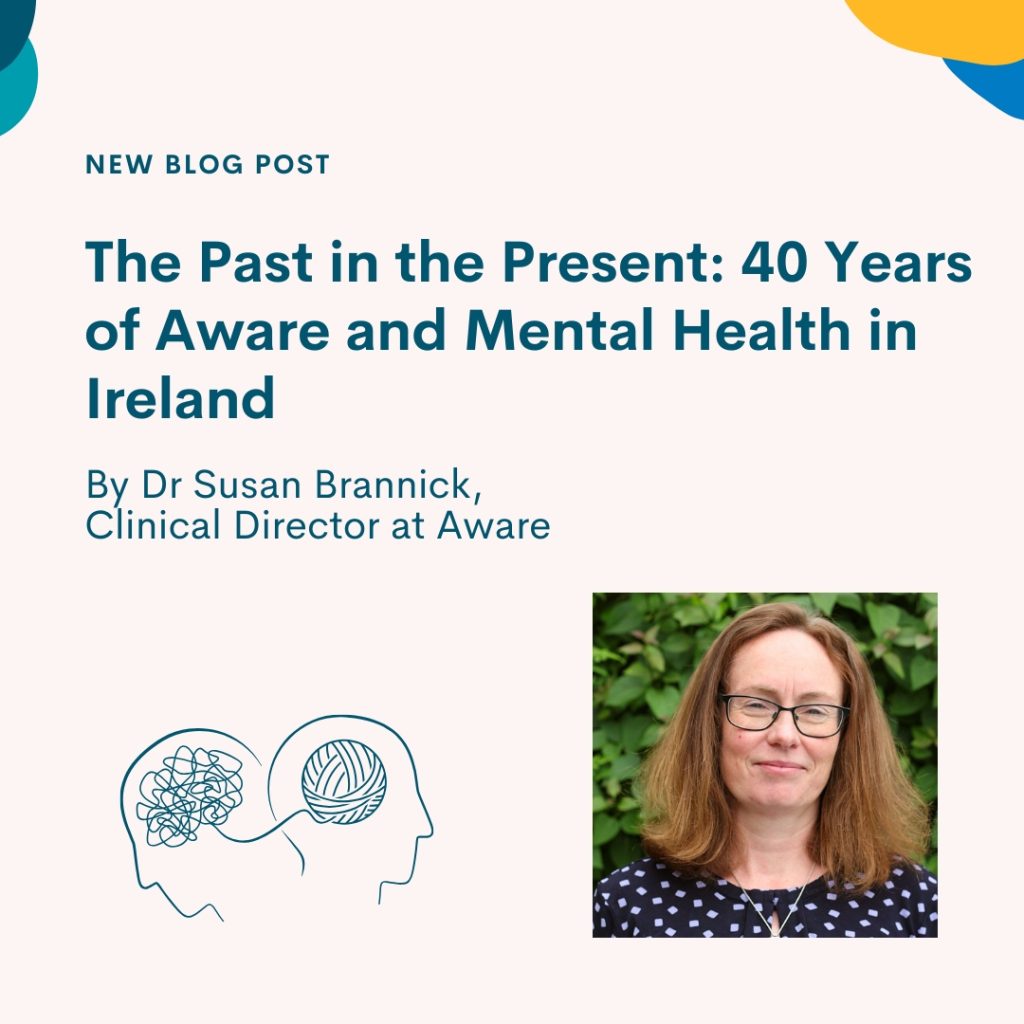It is often said in Cognitive Analytic Therapy that “the past is in the present.” On an individual level, this means the ways we relate to ourselves, to others, and to our problems are shaped by past experiences. What we once learned about how the world works continues to influence how we act today, often outside our awareness.
As Aware marks 40 years of supporting people with depression, bipolar, and anxiety, I believe this idea of the past in the present also applies collectively in 2025. It shapes how society understands mental health, how we respond to distress, and what supports we make available.
In 1985, the year Aware was founded, social challenges like unemployment and emigration likely affected people’s wellbeing in different ways. Today, we face new but familiar pressures: a housing crisis, cost-of-living struggles, and under-resourced mental health services. Gendered patterns persist too. Women are more likely to be diagnosed with depression or anxiety, while men often struggle with different barriers to help-seeking. Our 40th anniversary national survey reflected these trends. Women reported higher rates of diagnosis, while men were less likely to have sought professional support. This raises important questions: Are women’s experiences pathologised more readily? Do societal norms around masculinity keep men from seeking help? These are not abstract debates, but issues with real consequences for how services evolve to meet diverse needs.
The concept of recovery, too, has shifted over time. In the 1980s, Ireland was moving away from a traditionally heavy reliance on institutionalised care toward community-based, multi-disciplinary models. Today, the pendulum has swung the other way. Ireland now sits below the EU average for mental health bed availability, without a corresponding investment in community or crisis services.
Public attitudes have also shifted. Our survey found most people believe services have improved since 1985, yet 81% felt much more progress is needed. Financial barriers remain a significant obstacle. We may have left the asylum era behind, but many still find help is out of reach.
A collective hunt for meaning can also echo across the decades. In 1985, the phenomenon of “moving statues” captured the national imagination, drawing busloads of people in search of a miracle. Forty years later, what are we seeking? Today, instead of statues, we are immersed in a vast wellness industry, worth billions, promising cures, diagnoses, even salvation. Into this space, AI has arrived. Based on use so far, it seems that we are entrusting large language models with our deepest secrets, longings and uniquely human experiences. After we have proved we are not the robot, we then turn to robot intelligence to decode human experience and behaviour.
Where does this leave us? For me, the answer remains what it was in 1985; connection. Human connection is one of the strongest lifelines when life feels unbearable. Yet in a society becoming ever more digital, fragmented, and remote, opportunities to meaningfully connect are under threat.
When it comes to mental health services, we also need to continue advocating for sufficient funding that aligns with recommended guidance for mental health spending. An AI chatbot is no substitute for being heard and being therapeutically held by other humans when it feels like everything has fallen apart. We need a range of statutory mental health services to meet the diversity of mental health needs we now see in 2025 alongside the work of NGOs and charities like Aware, who continue to bridge critical gaps in support.
The dedicated volunteers and staff at Aware have spent the last 40 years offering a supporting light to those living through depression or anxiety. We remain committed to this work for decades to come.
You can find more information on our services at aware.ie and watch our Aware Mental Health Week webinar for a deeper discussion on what recovery means today.
This blog is by Dr Susan Brannick, Clinical Director at Aware as part of a monthly blog series.


